when was the last time you had an adventure?
should we pursue pleasure, or are we being irresponsible?
“I get the urge for going but I never seem to go.”
– Joni Mitchell, ‘Urge for Going (With Strings)’
“That’s what I like about traveling—you can sit down, maybe talk to someone interesting, see something beautiful, read a good book, and that’s enough to qualify as a good day. You do that at home and everyone thinks you’re a bum.”
– Before Sunrise
I’m rewatching Before Sunrise when I start panicking about every decision I’ve ever made. The film begins on a train between Budapest and Vienna and ends on a train between Vienna and Paris. It’s a twenty-four-hour vignette of a chance encounter between twenty-three-year-old Jesse (Ethan Hawke) and Celine (Julie Delpy). Celine is on her way home to Paris, but within the first quarter-hour of the film, Jesse convinces her to get off the train and explore Vienna with him:
“Think of it like this. Jump ahead ten, twenty years. Your marriage just doesn’t have that same energy anymore… You think of all the guys you’ve met and all the ones you never pursued and how things might have been different if you’d just picked up with one of them. Well, I’m one of them. You can consider this traveling back in time, to see what you are missing. See, this is really a big favor to both you and your future husband - it’s a chance to see how you really haven’t missed anything. That I’m just as boring and unmotivated as he is, hopefully more.”
Celine laughs, but she stands up. “Let me get my bag.”
Would you have got off the train? Or, maybe, more importantly: would you regret it, years later, if you didn’t? Jesse argues that the future was always going be depressing and dull, so the best thing you can do is leave yourself no untrodden pathways. Imagine: no regrets and no “what-ifs” to turn over and over in your mind as the years pass. Really, he just wants to get this fascinating girl off the train, so he’ll say anything, and it doesn’t matter what he says, because Celine was always going to get off the train.
But the point of Before Sunrise is that there are these little ways out of ordinary life, pockets of time which exist outside of reality. Richard Linklater got the idea for Before Sunrise when he spent a night with a girl he’d just met. “I want to make a film about this. Just this feeling,” he told her. The desperation at the end of the film – when Jesse and Celine cling to each other on a train platform, realising what goodbye actually means – is heightened when you know that the girl Linklater met all those years ago died in a motorcycle accident before he ever got to see her again. The great spread of your life, which Jesse imagines in his speech, can just as easily contract as it can expand. There is a very real possibility that there might be no future in which to have regrets.
Here’s what struck me, hard, while I watched Jesse and Celine fall in love. A question had appeared in my mind, fully formed: when was the last time I’d had an adventure?
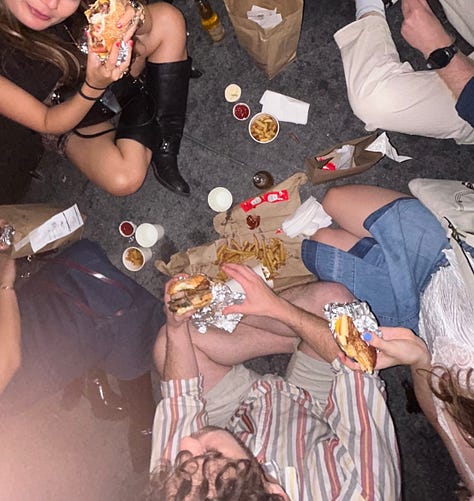


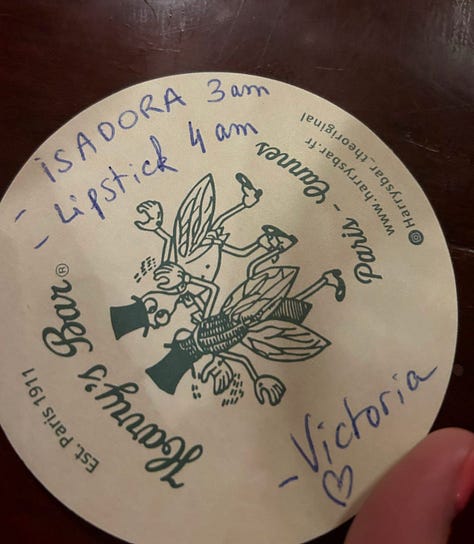


There was that Monday night in Paris when Alice and I met a group of girls on the street and we spent hours and hours looking for somewhere to dance. It was this weird odyssey of what felt like every jazz bar and hotel lobby in the city, and it ended under the willow tree on the square du Vert-Galant, a small green triangle next to the Pont Neuf which is apparently where postgrad students go to kiss strangers and argue about whether or not Europe is dying. And earlier this summer in Sicily, with another group of friends, there was the heady music we heard from our AirBnB after the sun had set, and we followed it down those narrow, crumbling streets until they opened up into a small piazza, where a DJ was playing Italodisco and where we danced and drank €1 glasses of wine, and befriended the entire cast of the local theatre troupe.
There was the summer before, when Jenny and I infiltrated a private event at a youth hostel in Athens which we weren’t staying at. There was New Years’ Eve a few years ago, when Rachel and I party-hopped and sang ‘Chaise Lounge’ by Wet Leg all the way home. The holiday which will always be remembered as the seven-nights-of-skinny-dipping. The time with the nightbus. The time which ended with a 4am ping-pong tournament in the grounds of Kings’ College. The times I can’t remember and the times I can’t write down — and the times I can remember and can write down but really should not publish.
None of these experiences are replicable – each one was the result of a perfect and completely random catalyst of time, place, and feeling. What about all the nights I aimed for spontaneity and instead found — an empty club, a lacklustre date, a damp sky? Or the times I said no – didn’t go to the party, didn’t get on the plane, didn’t cross the street – what adventures have I missed out on? And what is an adventure? Every example I can think of involves at least one of these elements: romance, travel, some kind of substance. Before Sunrise, with its kisses in parks, its Danubian graveyards and Eurorail trains, its cheap beers and its generous bartenders, has all three. But what’s the essence of an adventure? Can you have an adventure in your own city, by yourself, in daylight, without alcohol to soak up and break down your inhibitions? Or does an adventure require some degree of recklessness? Is it impossible without the abandonment of everyday responsibilities and mundanities? Do you have to be supplanted from reality? From home?
If the world was supposed to be our oyster, a lot of us seem keen to shut it closed. There’s this pervasive rhetoric that the point of life is a kind of gentle beige contentment: see “protecting your peace”, see “it’s okay to cancel plans”, see “clean girl era”, see “bedrotting”. You know the stats: loneliness is an epidemic, we spend too much time on our phones, nightclubs are shuttering, no one hosts parties anymore. A few weeks ago, a friend of mine was given some of the worst advice I’d ever heard: “You should always err on the side of caution.”
I get it. The problem with trying to live your life to the fullest is that your life still has to be there when you wake up the next morning. Which means: budgeting your money, your time, your body, your alcohol intake, your energy. We’ve all got to wake up on Monday and pay rent. I don’t want a life free from the glamour of kissing, planes, cocktails, but I only have so much time to spend dealing with their unglamorous consequences: heartbreaks, baggage claim, hangovers. How are you supposed to balance adventure with reality? My friends and I are constantly trying to figure out “the balance”, but we all just end up careening between “overdoing it” and “not doing it at all”. (“Balance is a scam,” my flatmate Mandy says). It’s hard not to live in extremes: you’re either skipping the party for a pilates class, or you can’t remember the last time you ate a piece of fruit. Watching Before Sunrise, I imagine sitting on a train, leaving everything behind – but I can’t do it. There’s so much right here: so much love, and so much I want to do, and so much I have to do.
And also, it’s hard to leave because I love my home. Over Christmas, I moved all my furniture around and finally framed my Edwina Sandys print of a couple taking a bath together. Everything in the painting – Couples – is intertwined: the couple’s legs under the water, the tails of the cats playing on the floor, the leaves of a well-nurtured flowering plant. The painting, to me, isn’t so much about coupledom as it is about home, about the mundanity and the intimacy of it, about the easy way you fit together: you and your home.
A few summers ago, I spent some time in Portugal with a boyfriend, our feet always sandy and my dresses always creased, and although I loved it, the way the rest of the world seemed to have disappeared and every beach seemed to belong to only us, when I got home I was so happy. In ‘Carey’, Joni Mitchell sings about living on an island with a lover and yet yearning to go back: “It sure is hard to leave here, Carey / But it’s really not my home. / My fingernails are filthy, I’ve got beach tar on my feet / And I miss my clean white linen and my fancy French cologne.” For a long time, I was uncomfortable with the part of myself that ached for a home. It seemed to counteract the story I told about myself, the story of someone who wasn’t conventional and didn’t want conventional things. But when I’m away, I do miss my clean white linen and my fancy French cologne. I do love that feeling of coming home, pouring my tea into one of my mugs, lighting my candles, picking out a book from my shelf, stretching out on my sofa.
And maybe it’s because I’m renting, and because I’ve never had a family home to go back to, but I’m always caught in the betweens: the desire to stay and the desire to go, to find an adventure or to keep a home, to pursue or to stop. I’m scared of making the wrong decision. The first time I watched Before Sunrise, I felt an ache which tasted like heartbreak. What was I yearning for? A holiday romance? The feeling of being understood? An Interrailing ticket? Tennessee Williams wrote, in The Glass Menagerie, that the movies are made up of “all of those glamorous people — having adventures — hogging it all, gobbling the whole thing up” while real people sit in the dark and watch it happen. There is a version of life where your only source of adventure and glamour comes from watching other people on the big screen, the small screen, the tiny screen.
Judith Brown writes in her book, Glamour in Six Dimensions, that glamour is “an experience that moves one out of the material world of demands, responsibilities, and attention to productivity, and into another, more ethereally bound, fleeting, beautiful and deadly.” Adventure takes you out of your life, but only briefly. But maybe the brevity is enough. Maybe that’s the whole point.
In Before Sunrise, real life haunts the edges of Jesse and Celine’s day together. When they wake up in the morning, their separation imminent, Jesse sighs and says: “We’re back in real time.” There’s this fragment of Joan Didion I think about a lot — I say fragment because it’s totally out of context, the way I think about it — which is: “where the kissing never stops”. I once used it in a love letter, trying to depict the feeling someone gave me of being outside of time, responsibility, reality. It’s like in ‘Ode to a Grecian Urn’, the Keats poem: the lovers reach out to each other in perpetuity, always on the brink of touching, which creates a kind of romantic paradox. “Bold lover, never, never canst thou kiss / Though winning near the goal yet, do not grieve; / She cannot fade, though thou hast not thy bliss”. They can “never, never” kiss, but they can also never stop kissing if they never start. And you know what else that reminds me of? How we get the word “adventure” from the Latin adventurus, which means “about to happen”, and which itself comes from advenire, “to arrive”. An adventure is the state of infinite but postponed arrival, an experience shaped by the knowledge that it is, like glamour, “ethereally bound, fleeting” and which occurs in the material world but, at the same time, exists outside of it.
The way our lives are set up, we’re presented with extremes: leave or stay, home or abroad, free or bound. A friend of mine is getting married this summer, another quit her job to travel the world. I drew the Hangman during a tarot reading once: the card says that sacrifice is necessary for change to happen. There’s a line in Elif Batuman’s The Idiot I think about a lot, where the characters are talking about “the quality of knowing what you want and how to get it”. What do I want? I want to write and travel and love and leave and stay and find and seek and make and unmake. What else? I want to look out a train window and see new sights pass by every second, and I want to look out my bedroom window and see the house that looks just like my house, the tree that’s always there, the purple glow of the BT Tower. I want the party and the pilates class. I want adventure and I want home. I don’t want to choose just one kind of life. But how do I get what I want?
The fuel of adventure – romance, travel, alcohol – can all be used to escape not just the monotony of everyday life, but to disconnect from our actual selves. There’s this part towards the end of Before Sunrise where Jesse talks about how he’s never been anywhere without himself. “But,” he says, “our time here has been completely out of time. Being with you has made me feel like I’m someone else.” Connection (which has many sources) can be a transcendent experience, but I think Jesse is wrong: I think adventure should help solidify who you are, not take you away from yourself. Earlier in the film, Celine tells Jesse, who doesn’t believe in fortunetellers: “I believe if there's any kind of God it wouldn't be in any of us, not you or me but just this little space in between. If there's any kind of magic in this world it must be in the attempt of understanding someone, sharing something.”
Should we pursue pleasure, or be responsible? I don’t have all the answers right now. Maybe the problem with making a choice is that pleasure has no singular form, source, or place. Multifaceted as it is, pleasure is not something which thrives without the guardrails of reality. There is never going to be a version of your life without lulls, liminalities, lags. And you are also never entirely safe from all the bizarre, impossible, serendipitous things that might happen. Your days are how you spend your life. How you spend your life is you. The point is not to live between adventures but to treat the between as an adventure — to maybe understand that life is mainly a lot of betweens and so what you have to do is try to inhabit them.





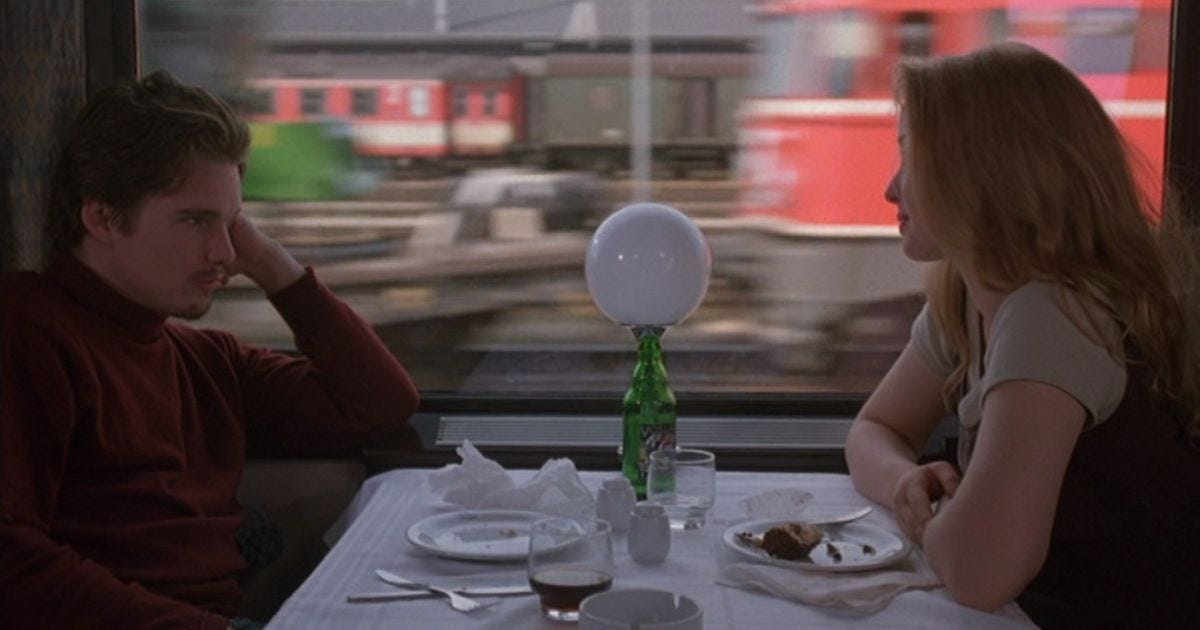

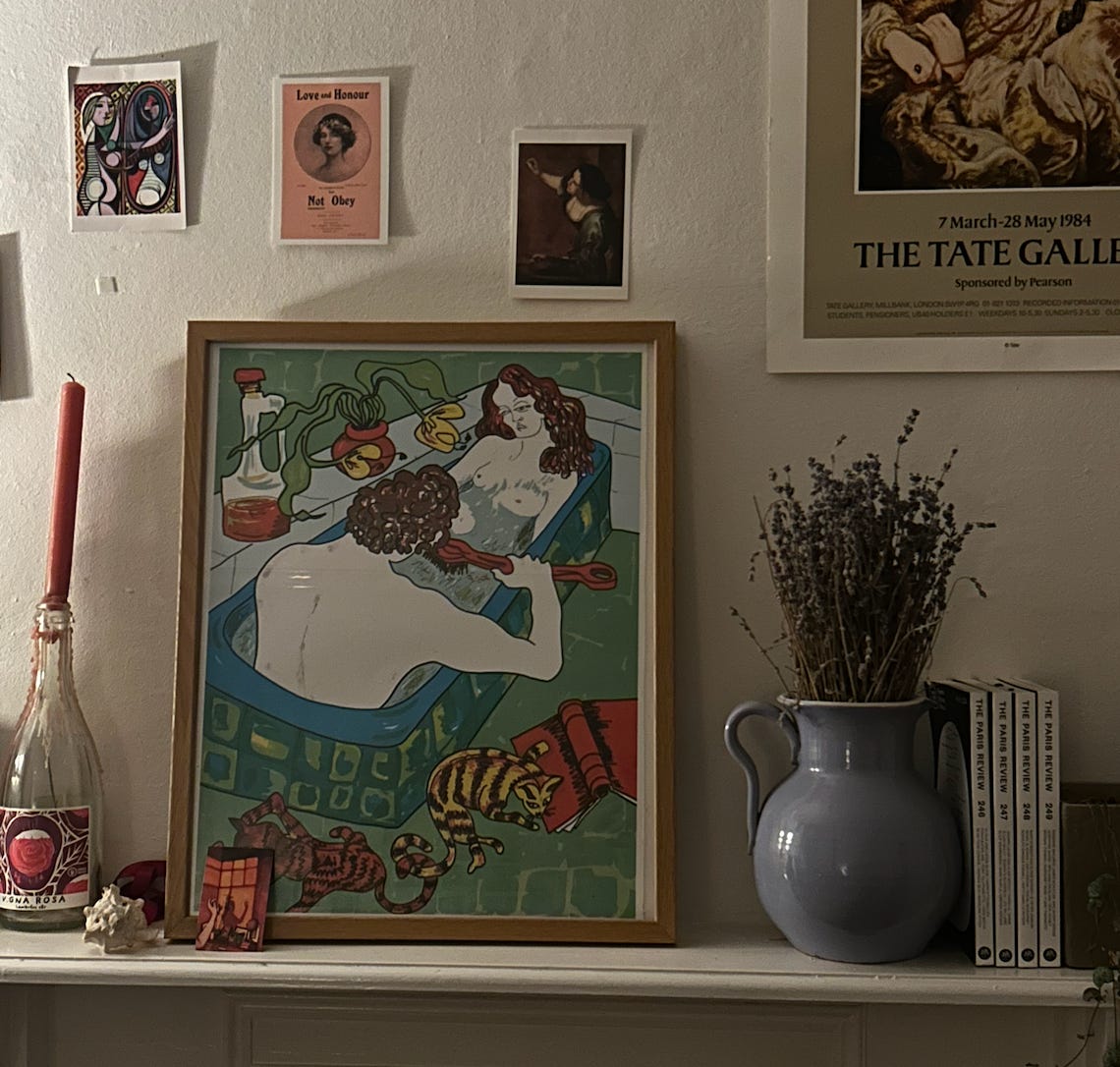
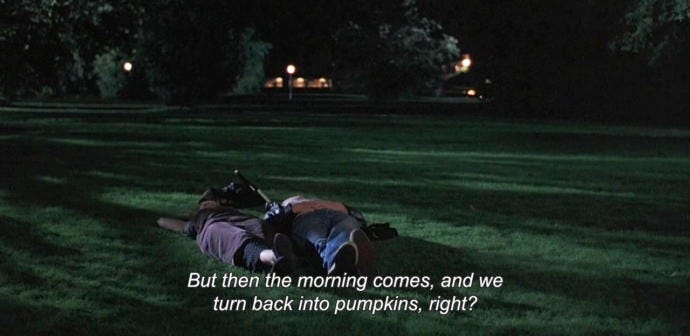
I fucking loved this. You’ve tapped into something I’ve been thinking about a lot atm. Why do I feel urged to over correct and have a wholesome weekend (even if I don’t want to) after a big weekend? You’ve also convinced me to watch Before Sunrise now. X
really enjoyed this after spending a year living in mexico and guatemala, now i’m back in the US and for the first time (ever) having a real home, a real relationship, but wanting to pick up and leave but also loving the sense of stability and security. love love love this piece